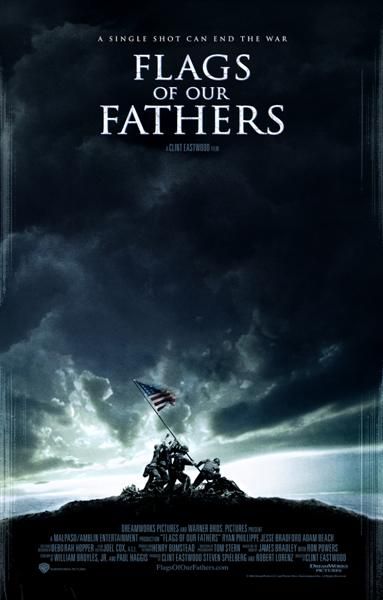Flags of Our Fathers

Paul and I squeezed in the last cinema screening of Clint Eastwood’s Flags of Our Fathers last night at Gateway’s Cinema Nouveau. Considering the awards season buzz swirling around it and the fact that there hasn’t been a good World War II movie in a long while, we felt the need to see it on the big screen.
The verdict: Flags is a good film but far from a masterpiece.
The problem lies mostly with the last 30 or so minutes of the film, which seem to fall into a dull ‘And then this happened, and this, and this’ pattern. It’s a problem that often affects films based on real-life events as the film makers feel the need to complete characters’ life stories. In the case of Flags of Our Fathers, the gripping, graphic flashbacks to combat on Iwo Jima suddenly cease and we’re ‘treated’ to a series of scenes set against the backdrop of a post-War American homefront.
The ultimate aim of Flags of Our Fathers appears to be an examination of what it is like to live with the ‘hero’ label, typically when you don’t feel you did anything heroic. Some characters accept the praise more easily than others, like Jesse Bradford’s Rene Gagnon, while others, like Adam Beach’s Native American Ira Hayes plunge into a drunken depression.

Beach’s character has some of the more interesting scenes because despite his hero status, Hayes is still a victim of social prejudice against Native Americans once he is back in the USA. He throws a fit when excluded from a bar that doesn’t serve Indians.
I also can’t say I was entirely bored by the Homefront scenes. The film makes a very interesting point about the power of media imagery in generating public interest and support for a war. As well as how lies can serve a positive, protective function – a mother takes comfort in the belief her dead son was one of the flag-raisers, when in reality he wasn’t in the famous image.
It’s just that ultimately it’s still the battle scenes, with an authentic washed out WWII feel, that give Flags of Our Fathers a surge of adrenaline and interest for the audience. But we keep being pulled away from them, and start receiving only tiny mouthfuls of combat gratification as the film progresses.
All this said, I’m looking forward to Eastwood’s companion film to Flads, Letters from Iwo Jima, which tells of the same battle from the perspective of the Japanese soldiers stationed there, defending their homeland.







Comments